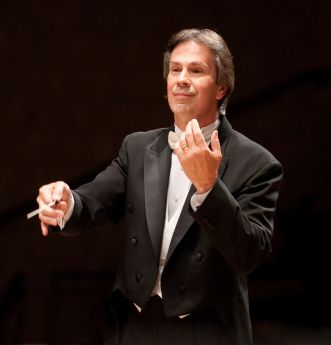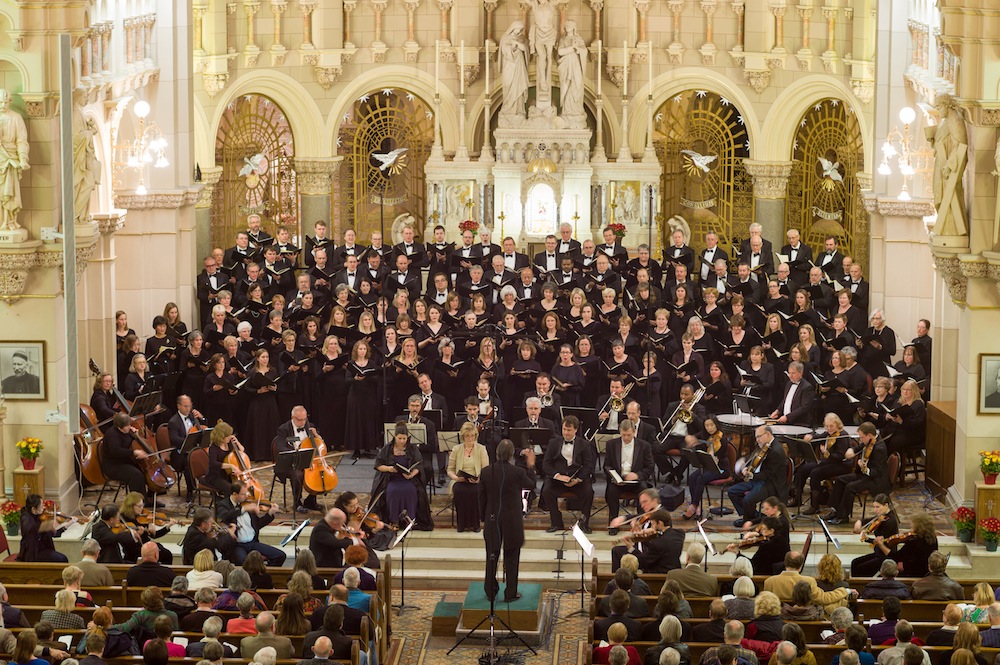Chicago Master Singers take flight in Dvořák rarity
For most conductors, directing a performance of Mozart’s Requiem would be a demanding enough evening of choral music.
Leave it to Alan Heatherington to offer not one but two large-scale masses in the Chicago Master Singers’ season-opening program, twining Mozart’s dark swan song with a genuine rarity, Dvořák’s Mass in D major.
The Dvořák came first on the program, heard Friday night at Divine Word Chapel in Techny (and to be repeated tonight). Few composers as popular as Dvořák wrote so much music that is still largely unknown today. Most of his operas, besides Rusalka, and choral works remain terra incognita (though Carlos Kalmar has revived Dvořák’s Requiem and The Spectre’s Bride in recent Grant Park seasons and Heatherington and CMS offered Dvořák’s Stabat Mater three years ago).
Dvořák wrote his Mass in D major in 1887 for wealthy architect and benefactor Josef Hlavka to consecrate a new chapel built on his estate. The original was written for organ and the wives of Hlavka and Dvořák were the two female soloists at the premiere. Five years later, the Czech composer recast the work for full orchestra and that was the version heard Friday night.
Heatherington is always a focused and dedicated musician but he always seems to bring an extra degree of missionary zeal when advocating for a rarity such as this. Indeed such was the power and dramatic impact of this performance that it frankly leaves one baffled as to why Dvořák’s Mass in D is hardly ever heard.
Dvořák was a deeply devout Roman Catholic and his faith is manifest in this score. The Mass in D is as affirmative and optimistic as Mozart’s Requiem is dark and searching. Yet despite ending several movements with rousing choral codas, the music is never simplistic and skillfully varied throughout.
There is always an acoustical tradeoff in the soaring North Shore chapel, which boasts imposing sound and striking visuals, yet also an inevitable lack of clarity in a high-ceilinged resonant space with a five-second decay.
Yet even with that sonic hurdle, Heatherington and his forces still brought out the myriad riches of this score. The opening Kyrie is launched with a seraphic melody that could have come from no one else, and there is a confiding lyricism to this music that was well served by the warm, enveloping sound of the Master Singers ensemble.
Heatherington alertly underlined Dvořák’s close textual tone painting as with the jarring dramatic outburst in the “Crucifixus” of the Credo and the ensuing rejoicing of the sopranos in the high-flying “Et resurrexit.” The heaven-storming fugal choruses of the Gloria were exhilarating, nicely contrasted with the somber organ-led “Qui tollis” section. Throughout Heatherington pointed up dynamic contrasts as with the soft women’s voices at the start of the Credo and the emphatic tutti responses by the men.
The vocal quartet has few opportunities in this work but acquitted themselves solidly, and the organ introduction to the Benedictus was sensitively played by Richard Boldrey.
But Dvořák’s Mass is really a showpiece for chorus, and the Chicago Master Singers, 130 strong, showed they were fully up to the challenge. There were fitful intonational excursions in some high exposed passages but for the most part the non-professional ensemble sang with impressive power, polish and cohesion. Heatherington’s calibrated direction was alive to the drama as surely as the ecclesiastical mystery and spiritual jubilation.
The performance of Mozart’s Requiem was equally accomplished. Here too one had to make allowances for the sonic blur, especially in fast sections like the Dies irae. Yet Heatherington kept the choral sections and Ars Viva orchestra clearly defined and as transparent as possible.
Purists may sniff at any performance of an 18th-century mass with a 100-plus chorus, but Heatherington’s artful balancing showed how it is possible to field such a large ensemble while keeping the forces aligned and in synch.
Of the four soloists, Sarah Holman’s light mezzo didn’t project clearly into the hall and Peder Reiff’s tenor was serviceable at best. Michelle Areyzaga’s bright luminous soprano made the most of her opportunities with lovely singing in the Lux aeterna. At the low end, baritone Gerard Sundberg anchored the quartet firmly with a sonorous, expressive solo in the Tuba mirum.
The Ars Viva Orchestra played quite well, but again it was the Chicago Master Singers who really shined, bringing daunting, dark power to the Rex Tremendae and Confutatis, thrilling excitement to the Sanctus. and shimmering tone to the Hostias.
The program will be repeated 7 p.m. Sunday. chicagomastersingers.org.
Posted in Uncategorized



